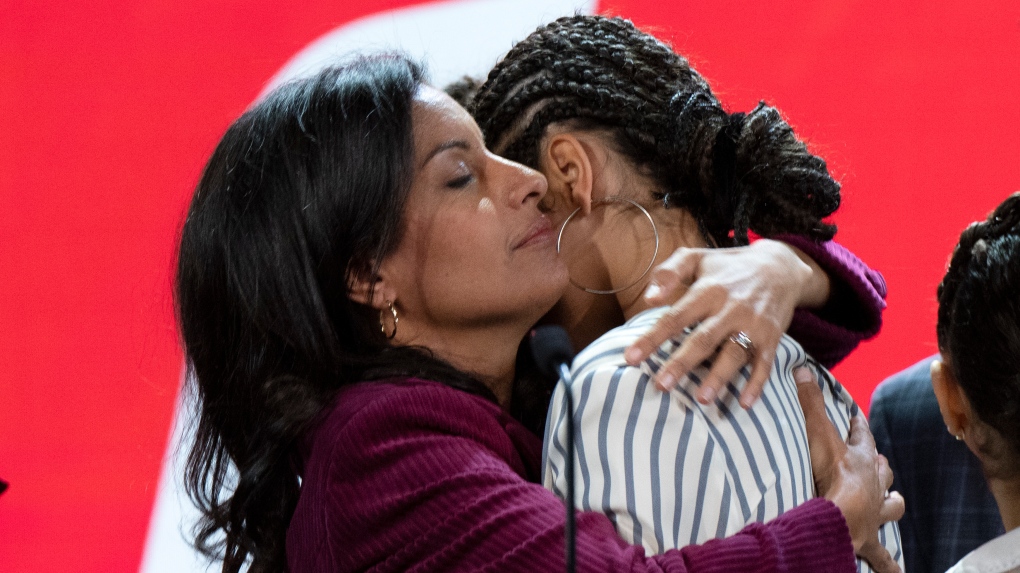The Quebec Liberal Party will retain official Opposition status
CTV News has declared the Quebec Liberal Party (PLQ) will retain its official Opposition status, and Party Leader Dominique Anglade has been re-elected.
The Liberals won a total of 21 seats, most of which were in and around the island of Montreal.
The news was met with thunderous applause at the Liberal headquarters at the Corona Theatre.
"During the entire campaign, we sent a message to reunite Quebecers," said Anglade during her speech to supporters. "Whether you voted for us or for another party, our door will always be open."
While her speech was almost completely in French, she pivoted during one sentence to speak directly with her English-speaking base.
"Let me be clear: we will represent all Quebecers, from all strides."
With Anglade's victory, the PLQ team can breathe a sigh of relief after a campaign rife with uncertainty for the future of the party.
That's because several ridings traditionally considered deep-red Liberal strongholds in Montreal's west side and Laval were polling with increased support for other parties.
There are several reasons for that shift -- experts have chalked it up to displeasure with the party's performance during its last mandate. Francois Legault's Coalition Avenir Quebec (CAQ) led a divisive first mandate defined by sweeping language and secularism legislation, and members of the Liberal base expressed dissatisfaction with the Liberals, who were unable to soften it.
 Quebec Liberal Leader Dominique Anglade hugs her daughter, Clara, after speaking to supporters after the results in the provincial election at the PLQ headquarters, in Montreal, Monday, Oct. 3, 2022. THE CANADIAN PRESS/Ryan Remiorz
Quebec Liberal Leader Dominique Anglade hugs her daughter, Clara, after speaking to supporters after the results in the provincial election at the PLQ headquarters, in Montreal, Monday, Oct. 3, 2022. THE CANADIAN PRESS/Ryan Remiorz
ROOM TO RECOVER
Liberal Leader Dominique Anglade was at a disadvantage throughout the campaign as a relatively unknown candidate, compared to Legault. This was her first election as party leader, and support for her as a candidate waned through it, with polls at times suggesting she may lose her own seat.
What voters can expect is a considerably weaker Opposition than the Liberal Party has been in the past. The National Assembly has changed quite a bit in the last decades as the province has transitioned out of its two-party paradigm. Gone, for now, are the days of Liberal and Parti Quebecois dominance over Quebec politics -- though the new era is still taking shape.
"We're still here, we're going to rebuild stronger," said the Liberal candidate for Fabre, Monique Sauvé. She told CTV she thought Anglade led an "amazing campaign," despite the limitations posed by the pandemic.
"It was two years that people didn't have to get to know her," she said.
The party's own insiders have acknowledged the party is in need of some serious reflection if it hopes to regain prominence in provincial politics.
Over the next four years, the Liberals will try to renew its relationship with French speaking populations outside Montreal, where support for the party is weak. It will also need to strengthen its base inside Montreal, especially in the city's west.
"A lot of long-time Liberals this time did not vote," said veteran party member Carlos Leitão. "We need to continue to reach out to those folks."
"The bigger challenge is to reach out to the rest of the province," he added.
CTVNews.ca Top Stories

opinion Tom Mulcair: Prime Minister Justin Trudeau's train wreck of a final act
In his latest column for CTVNews.ca, former NDP leader and political analyst Tom Mulcair puts a spotlight on the 'spectacular failure' of Prime Minister Justin Trudeau's final act on the political stage.
B.C. mayor gets calls from across Canada about 'crazy' plan to recruit doctors
A British Columbia community's "out-of-the-box" plan to ease its family doctor shortage by hiring physicians as city employees is sparking interest from across Canada, says Colwood Mayor Doug Kobayashi.
'There’s no support': Domestic abuse survivor shares difficulties leaving her relationship
An Edmonton woman who tried to flee an abusive relationship ended up back where she started in part due to a lack of shelter space.
opinion King Charles' Christmas: Who's in and who's out this year?
Christmas 2024 is set to be a Christmas like no other for the Royal Family, says royal commentator Afua Hagan. King Charles III has initiated the most important and significant transformation of royal Christmas celebrations in decades.
Baseball Hall of Famer Rickey Henderson dead at 65, reports say
Rickey Henderson, a Baseball Hall of Famer and Major League Baseball’s all-time stolen bases leader, is dead at 65, according to multiple reports.
Arizona third-grader saves choking friend
An Arizona third-grader is being recognized by his local fire department after saving a friend from choking.
Germans mourn the 5 killed and 200 injured in the apparent attack on a Christmas market
Germans on Saturday mourned the victims of an apparent attack in which authorities say a doctor drove into a busy outdoor Christmas market, killing five people, injuring 200 others and shaking the public’s sense of security at what would otherwise be a time of joy.
Blake Lively accuses 'It Ends With Us' director Justin Baldoni of harassment and smear campaign
Blake Lively has accused her 'It Ends With Us' director and co-star Justin Baldoni of sexual harassment on the set of the movie and a subsequent effort to “destroy' her reputation in a legal complaint.
Oysters distributed in B.C., Alberta, Ontario recalled for norovirus contamination
The Canadian Food Inspection Agency has issued a recall due to possible norovirus contamination of certain oysters distributed in British Columbia, Alberta and Ontario.


































